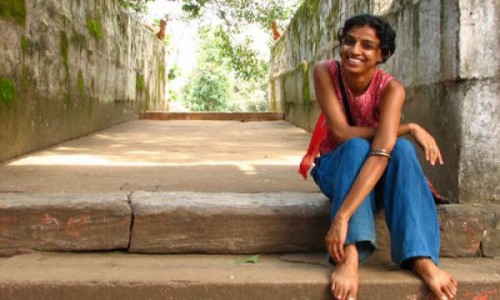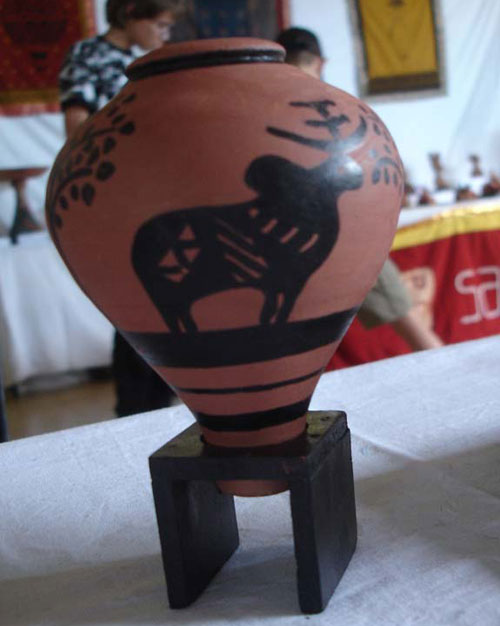Jewels of Wisdom: See how Sanchali is blending Education and Jewellery
Sanchali, a social project, provides free alternate education to children & employment to the women in rural areas. We chat up with Dakshayini Gowda to learn how beautifully she blends education with jewellery to make this happen. “We have created look-alikes of pottery, textile, beads, etc. of that period to give them a chance to learn history in a fun, interactive, lively and more effective manner,” Dakshayini says. And since she wanted to ensure that the workshops were free for all, she decided to fund them by starting an eco-friendly jewellery project with the women in the villages in Karnataka.

Sanchali, a social project, provides free alternate education to children & employment to the women in rural areas. We chat up with Dakshayini Gowda to learn how beautifully she blends education with jewellery to make this happen.

Just like most granddaughters Dakshayini Gowda too grew up admiring the jewels that belonged to her grandmother. “There was the jewellery in gold and occasionally in silver too,” she recalls. But that’s not what got her excited. In her grandmother’s chest also lay jewellery made out of seeds, flowers, leaves and other things that could be recycled. “These had no value in terms of money and they did not even shine but were simply awesome,” she adds.
No wonder she fell in love with all things inimitable, interesting and recyclable at a very young age. And so when her project, Sanchali, required financial aid to take the next step ahead, she found the help in her childhood memories. Sanchali, which means movement in Sanskrit, is involved in alternative teaching of history to school children, mainly focusing on the art and crafts of the Indus valley civilization.

They conduct workshops, especially for schools in rural areas, to reach out to as many children as possible. “These workshops are free because we feel that money should not be a constraint when it comes to learning,” she says. And funding these workshops is Sanchali’s eco-friendly jewellery project, which in turn also provides rural women with the opportunity of learning life skills that makes them financially independent and and increases their self-confidence. We join Dakshayini as she visits remote villages in the country and learn more about Sanchali.

Dakshayini holds a Bachelor degree in fine arts (sculpture) from Chitrakala Parishat, Bangalore and a Masters degree in Archaeology and Museology from Maharaja Sayajirao University, Baroda.
“It was my academic background that gave me the idea to get involved in a social sanchaliproject. As a part of my Masters, I researched on the pottery, jewellery, textiles etc. of the Indus Valley civilization, which got me in touch with many artists/es like potters, block printers, craftsmen, etc. During the course of studying I found myself fascinated by the skills that were used by the artists/es back then and I realised how their skills and techniques were far ahead of their times,” she says, adding, “So I decided to take this particular aspect of history to the students to make both the subject interesting and widen their knowledge.”
So she started creating ‘copies’ of the pieces so that the children could touch and feel each item, “I wanted them to do more than just look at the pictures in books or in glass cases in museums.” Sanchali’s workshops include games, drawings, puzzles, etc. that revolve around the subject.

“We have created look-alikes of pottery, textile, beads, etc. of that period to give them a chance to learn history in a fun, interactive, lively and more effective manner,” she says.
And since she wanted to ensure that the workshops were free for all, she decided to fund them by starting an eco-friendly jewellery project with the women in the villages in Karnataka.
“It was during my numerous trips to remote villages that I learnt that regional and ancestral arts and crafts were being overshadowed by westernisation. These visits also sparked another idea, that of creating eco-friendly jewellery with the skill set of the rural woman, who were/are in possession of skills handed down to them from many generations,” she says.
Sanchali now conducts workshops for women in Karnataka and trains them in making handcrafted and eco-friendly jewellery using the concept of re-cycling.
It was mainly started to fund our free school workshops but at the same time do so something that would add to the cause. So I started identifying those women who were interested in learning and working in a community. Sadly enough, we also came across some women who were not allowed to leave the house to work; so we took the work to their doorstep; we trained them at their homes and followed it up by collecting finished goods and making payments at the doorstep too.
Today, the project provides livelihood to many such women, “Our goal is to revive the dying tradition of re-cycling. At the same time we aspire to encourage art novices and connoisseurs to draw upon their proclivity for nature.”
Dakshayini has even created jewellery from waste material but her favourite jewellery collection happens to be the one which uses fabric scraps.
“Our textile range uses wastes/leftovers from the tailors. We use a lot of old Indian Varanasi silk material and I try to preserve the textile, no matter how fragile it is,” she says, adding, “This collection is not only recyclable but is also a window to the beauty of the age old traditions.”
Sanchali’s products are now available at various stores in India and abroad. But this is just the beginning for Dakshayini’s dream is to bring jewels, education and beauty to the lives of many more. She continues to use education, traditional values & skills and recyclable material to bring beauty and light to one and all.
To know more drop by at dakshayinigowda.blogspot.com or write to Dakshyayini at sanchali[dot]in[at]gmail[dot]com
If you found our stories insightful, informative, or even just enjoyable, we invite you to consider making a voluntary payment to support the work we do at The Better India. Your contribution helps us continue producing quality content that educates, inspires, and drives positive change.
Choose one of the payment options below for your contribution-
By paying for the stories you value, you directly contribute to sustaining our efforts focused on making a difference in the world. Together, let’s ensure that impactful stories continue to be told and shared, enriching lives and communities alike.
Thank you for your support. Here are some frequently asked questions you might find helpful to know why you are contributing?


This story made me
-
97
-
121
-
89
-
167













